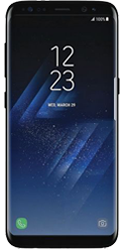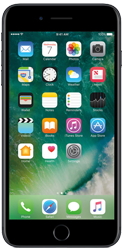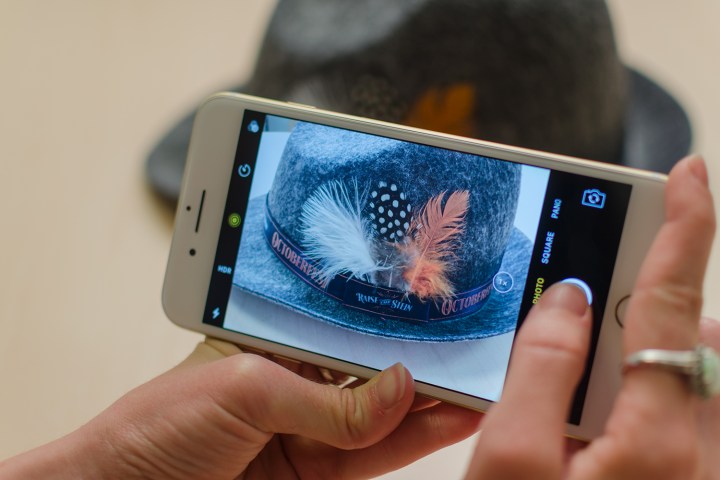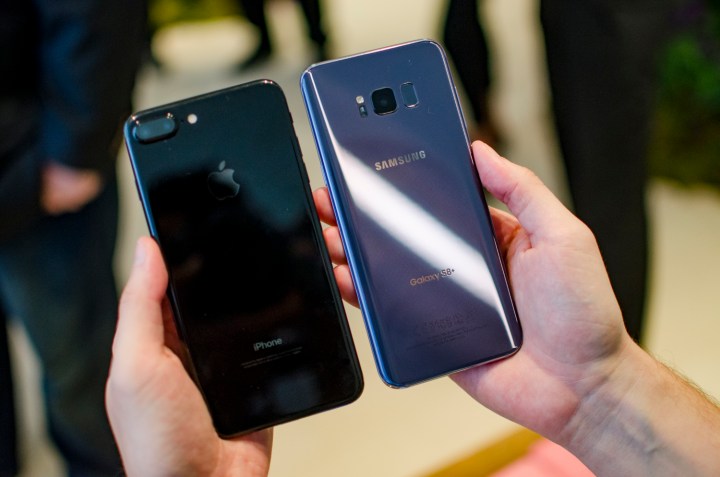
Not to worry, though; Samsung is a ginormous company, and it has a second chance to regain consumer trust with the Galaxy S8 and S8 Plus. So how does Samsung’s latest flagship stack up against Apple’s latest, plus-sized headset? We lauded the latter device in our iPhone 7 Plus review, but here, we examine how its flagship features compare with those of the Galaxy S8 Plus. Read on to find out which smartphone is right for you.
Specs
| Galaxy S8 Plus | iPhone 7 Plus | |
| Size | 159.5 x 73.4 x 8.1 mm (6.28 x 2.89 x 0.32 in) | 158.2 x 77.9 x 7.3 mm (6.23 x 3.07 x 0.29 in) |
| Weight | 6.1 ounces (173 grams) | 6.63 ounces (188 grams) |
| Screen | 6.2-inch Quad HD+ Super AMOLED touchscreen | 5.5-inch Retina HD LED-backlit touchscreen |
| Resolution | 1,440 x 2,960 pixels (529 ppi) | 1,080 x 1,920 pixels (401 ppi) |
| OS | Android 7.0 Nougat | iOS 10 |
| Storage | 64GB | 32, 128, 256GB |
| MicroSD card slot | Yes | No |
| NFC support | Yes | Yes |
| Processor | Qualcomm Snapdragon 835 Samsung Exynos 9 Series 8895 (International) |
A10 Fusion with 64-bit architecture, M10 motion coprocessor |
| RAM | 4GB | 3GB |
| Connectivity | 4G LTE, GSM, CDMA, HSPA+, 802.11a/b/g/n/ac Wi-Fi | 4G LTE, GSM, CDMA, HSPA+, 802.11a/b/g/n/ac Wi-Fi |
| Camera | 12MP rear with OIS, 8MP front | Dual 12MP rear, 7MP front |
| Video | 4K | 4K |
| Bluetooth | Yes, version 5 | Yes, version 4.2 |
| Fingerprint sensor | Yes | Touch ID |
| Other sensors | Barometer, gyroscope, accelerometer, proximity sensor | Barometer, 3-axis gyro, accelerometer, proximity sensor, ambient light sensor |
| Water resistant | Yes, IP68 rated | Yes, IP67 rated |
| Battery | 3,500 mAh | 2,900 mAh |
| Charger | USB Type-C | Lightning |
| Marketplace | Google Play Store | Apple App Store |
| Color offerings | Black, silver, orchid gray, coral blue (international), gold (international) | Gold, rose gold, silver, black, jet black |
| Availability | AT&T, Verizon, Sprint, T-Mobile | AT&T, Verizon, Sprint, T-Mobile, Unlocked |
| Price | Starting at $840 | Starting at $770 |
| DT review | First Take | 4/5 Stars |
Based on early benchmarks, Qualcomm’s Snapdragon 835 in Samsung’s Galaxy S8 Plus may have a processor that’s in some ways better than Apple’s A10 Fusion chip in the iPhone 7 Plus. Keep in mind, though, that Apple has the benefit of highly optimized software, allowing it to eek more out of its processors than manufacturers which source third-party chips.
The S8 Plus does have 4GB of RAM, which is more than the iPhone’s 3GB, but Apple’s smartphones are often more memory-efficient — more RAM doesn’t necessarily mean the S8 will offer better performance. The S8 Plus is limited to 64GB of storage, while the iPhone has more storage options. But you can add up to 256GB of space or higher via a MicroSD card slot on the S8 Plus, if you so desire.
The Galaxy S8 Plus boasts a superior battery than the iPhone (3,500 mAh vs. 2,900 mAh), so you can expect it to last longer, though it should be noted that iPhones usually have stellar standby battery life. In terms of connectivity, the S8 Plus is equipped with Bluetooth 5.0, which should offer improved range and transfer speed over version 4.2 on the iPhone 7 Plus.
We’ll have to test real-world performance of the S8 Plus to see how it compares to the iPhone 7 Plus before we crown a winner.
Winner: Tie
Design, display, and durability
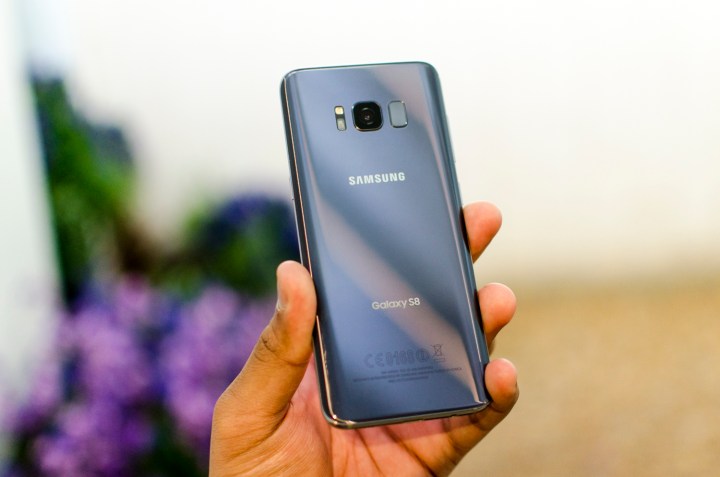
If you’re buying a phone with the “Plus” suffix, the screen is probably pretty important to you. Luckily, both these phones are designed beautifully, with stunning displays to match.
Interestingly, the 5.5-inch iPhone is a bit bigger than the 6.2-inch S8 Plus, and nearly half an ounce heavier — that’s a lot of unnecessary weight and bezel. The screen itself is bright and colorful, but with a resolution of 1,080 x 1,920 pixels, it won’t outperform the Galaxy S8 Plus, which has a 1,440 x 2,960 pixel resolution. The S8 Plus squeezes in far more pixels per inch than the iPhone.
The iPhone 7 Plus also looks dated next to the S8 Plus (at least the front). We chalk that up to Samsung’s heavy bezel-trimming.
But the iPhone 7 Plus may be more durable. The S8 Plus is wrapped in glass on both sides, making it slippery — a single drop could be disastrous. Thankfully, both are stand up to water exposure. The iPhone 7 Plus is IP67 water- and dust-resistant. The Galaxy S8 Plus is IP68-rated, which is slightly better.
The iPhone 7 Plus may be a tad more durable than the S8 Plus, but nothing beats a futuristic design, and a great display. The S8 Plus takes the cake here.
Winner: Samsung Galaxy S8 Plus
Software
Samsung has been hard at work, making improvements and additions to its software suite to help overcome Apple’s iOS powerhouse. The Galaxy S8 Plus will come equipped with a new artificially intelligent companion called Bixby, who promises to revolutionize the way you interact with your smartphone and your everyday tech.
More: What’s in a Name? Meet Bixby – the smart sidekick who’ll help you use your digital gear
Anything you can perform by touch, you can ask Bixby to do — though you’ll need to use Samsung’s Bixby-supported apps. Bixby can also set reminders based on location and time; recognize objects via the camera app; and offer personalized information based on your where you are and what you typically do at a certain time of day.
The S8 Plus runs Android 7.0 Nougat with Samsung’s TouchWiz skin, while the iPhone 7 Plus runs iOS 10. Apple’s operating system will certainly be more optimized for performance, but that doesn’t mean the S8 Plus will offer a poor software experience. Bixby could end up being more useful than Siri, and you may find some Android specific features to be better than iOS, such as notifications.
We’ll have to compare the user experience on the S8 Plus before we can claim a winner.
Winner: Tie
Camera
Both of these phones sport best-in-class cameras. We lauded the iPhone 7 Plus’ dual 12-megapixel rear cameras, and we’ll laud them today; the 56-mm telephoto lens offers the best optical and digital zoom that you’ll find on a smartphone camera. The tap-zoom features work incredibly well, and no one else offers a better Portrait Mode than Apple. The 7-megapixel selfie camera on the front does its job admirably, though it pales in comparison to the cameras on the back.
Overall, the iPhone is an amazing daytime camera, with a powerful flash and lots of neat features. In the dark, though, the Galaxy S8 Plus’ cameras may find their time to shine. Nothing much has changed over the Galaxy S7 on the rear of the S8 Plus — it still uses a 12-megapixel camera. Samsung’s cameras are excellent at adjusting to low-light environments, resulting in more vibrant night-time shots. We’ll have to do more testing to see if it improves on the S7 at all or if they offer the same experience. In the front, the S8 Plus has an improved 8-megapixel camera.
Thanks to a number of more useful features, like Portrait Mode and the optical zoom lens, the iPhone comes out on top, but it’s possible Samsung has some tricks up their sleeve that haven’t yet seen the light of day.
Winner: iPhone 7 Plus
Pricing

The iPhone 7 Plus costs $770 for the 32GB model, ranging up to $969 for 256GB of storage. The S8 Plus comes with 64GB of internal storage, but it starts at $840. The 128GB model of the iPhone 7 Plus only costs $20 more than the 64GB S8 Plus. Here’s a comparison of the pricing for the two devices.
| Samsung Galaxy S8 Plus | Apple iPhone 7 Plus | |
| AT&T | $850 or $28.34 per month for 30 months | $770 or $25.67 per month for 30 months |
| Sprint | $850 or $35.42 per month for 24 months | $770 or $32.09 per month for 24 months |
| T-Mobile | $850 or $30 per month for 24 months with a $130 down payment | $770 or $30 per month for 24 months |
| Verizon | $840 or $35 per month for 24 months | $770 or $32.08 per month for 24 months |
The Galaxy S8 Plus is expensive. While it may offer some improvements, the iPhone 7 Plus is currently the better buy.
Winner: iPhone 7 Plus
Overall Winner: iPhone 7 Plus
There’s still a lot to be decided on which phone lasts longer, performs better, and captures better photos. If you don’t have an operating system allegiance, the iPhone 7 Plus is the better buy at the moment because not only is it more affordable, it’s also going to offer an experience that’s comparable (if not better) than the S8 Plus in some areas. There’s no denying the S8 Plus looks better and is more compact, though.
